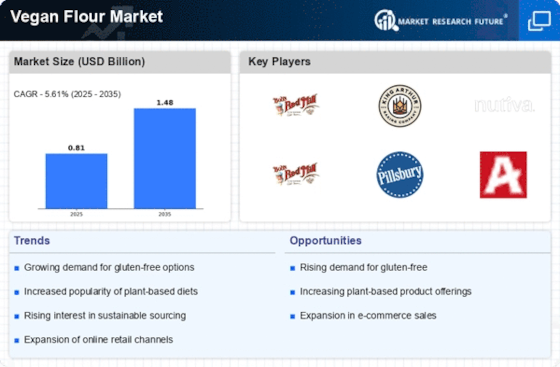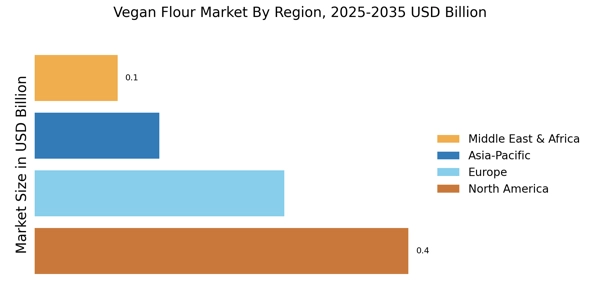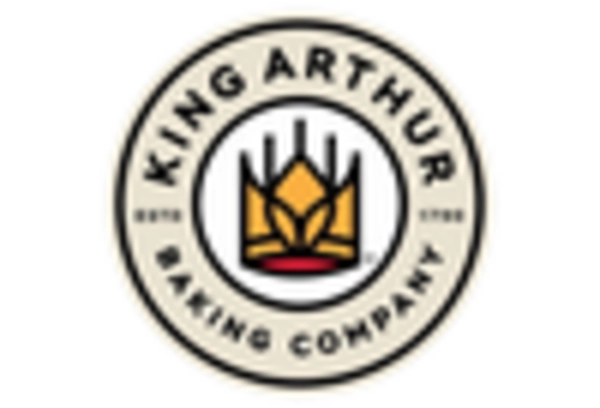Innovations in Food Technology
Innovations in food technology are transforming the Vegan Flour Market, leading to the development of new products that cater to diverse consumer preferences. Advances in milling techniques and ingredient sourcing have enabled the creation of high-quality vegan flours that retain nutritional value while enhancing flavor and texture. For instance, the introduction of gluten-free vegan flours has opened new avenues for consumers with dietary restrictions. The market for gluten-free products is expanding rapidly, with projections indicating a compound annual growth rate that could exceed 10%. This technological evolution not only diversifies product offerings but also positions the Vegan Flour Market as a key player in the broader health food sector.
Increase in Plant-Based Diet Adoption
The rise in the adoption of plant-based diets is a pivotal driver for the Vegan Flour Market. As consumers increasingly seek alternatives to animal products, the demand for vegan flour has surged. Reports indicate that the plant-based food market is projected to reach substantial figures, with a significant portion attributed to flour derived from legumes, nuts, and grains. This shift towards plant-based eating habits is not merely a trend but appears to be a long-term lifestyle change, influencing purchasing decisions across various demographics. The Vegan Flour Market is likely to benefit from this growing consumer base, as more individuals incorporate vegan flour into their diets for health and ethical reasons.
Rise of E-Commerce and Online Retailing
The rise of e-commerce and online retailing is reshaping the landscape of the Vegan Flour Market. With the increasing preference for online shopping, consumers now have access to a wider variety of vegan flour products than ever before. This shift is particularly beneficial for niche products that may not be readily available in local stores. Data indicates that online grocery sales have seen exponential growth, with a significant portion of consumers opting to purchase specialty items, including vegan flours, through digital platforms. This trend not only enhances convenience for consumers but also allows brands within the Vegan Flour Market to reach a broader audience, potentially increasing market share and sales.
Focus on Sustainable Packaging Solutions
The focus on sustainable packaging solutions is becoming increasingly relevant within the Vegan Flour Market. As environmental concerns gain traction among consumers, brands are responding by adopting eco-friendly packaging materials. This shift is not only aligned with consumer values but also enhances brand loyalty and trust. Research indicates that a significant percentage of consumers are willing to pay a premium for products that utilize sustainable packaging. Consequently, companies in the Vegan Flour Market that prioritize sustainability in their packaging strategies may find themselves at a competitive advantage. This trend reflects a broader movement towards environmental responsibility, which is likely to shape consumer preferences in the coming years.
Growing Awareness of Nutritional Benefits
The growing awareness of the nutritional benefits associated with vegan flours is a significant driver for the Vegan Flour Market. Consumers are increasingly informed about the advantages of incorporating plant-based ingredients into their diets, such as higher fiber content and essential nutrients. Research suggests that flours made from legumes and whole grains can provide superior health benefits compared to traditional wheat flour. This heightened awareness is influencing consumer choices, leading to a marked increase in the purchase of vegan flour products. As health-conscious individuals seek to enhance their diets, the Vegan Flour Market is poised to experience sustained growth, driven by the demand for nutritious and wholesome alternatives.
















